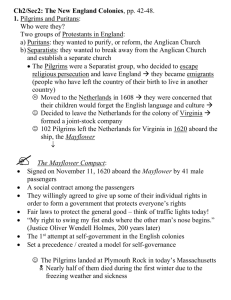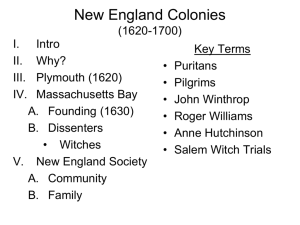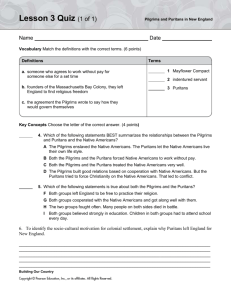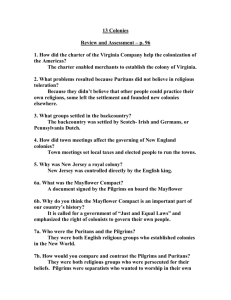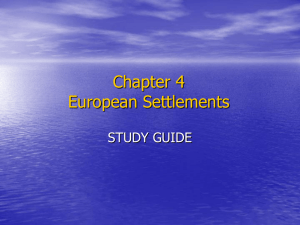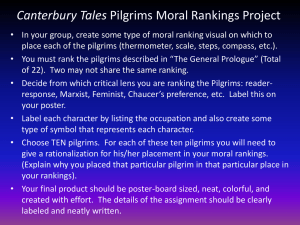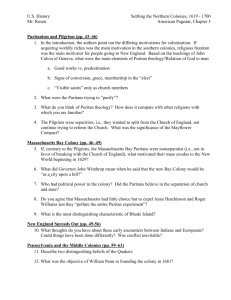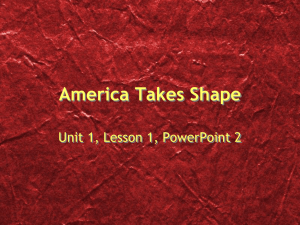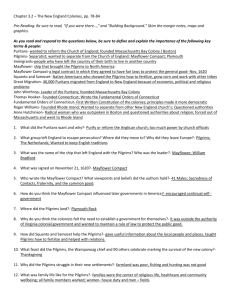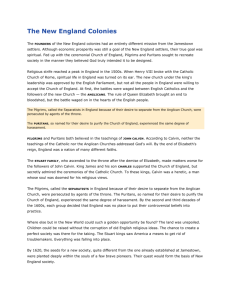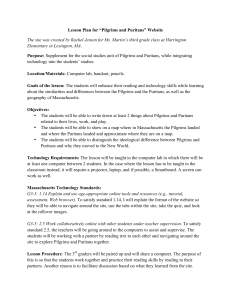Essential Questions – Pilgrims and Puritans Date Essential Question
advertisement
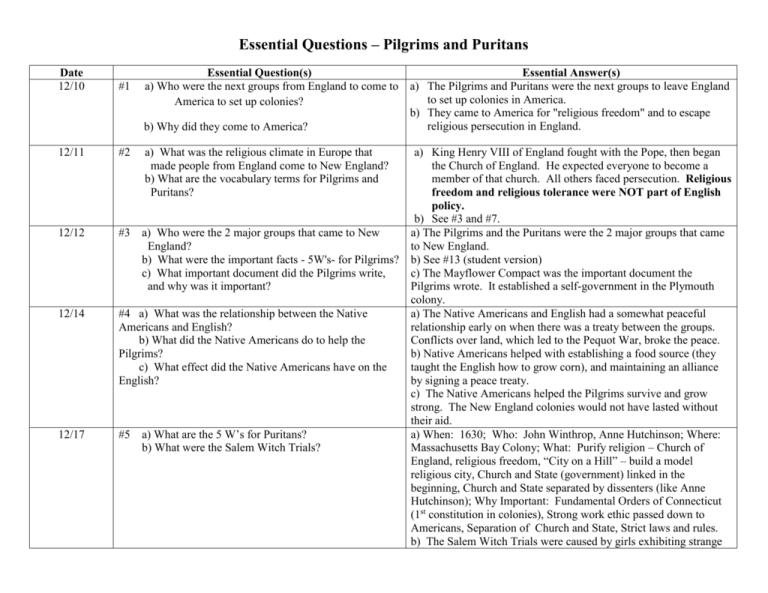
Essential Questions – Pilgrims and Puritans Date 12/10 Essential Question(s) Essential Answer(s) a) Who were the next groups from England to come to a) The Pilgrims and Puritans were the next groups to leave England to set up colonies in America. America to set up colonies? b) They came to America for "religious freedom" and to escape religious persecution in England. b) Why did they come to America? #1 12/11 #2 a) What was the religious climate in Europe that made people from England come to New England? b) What are the vocabulary terms for Pilgrims and Puritans? 12/12 #3 a) Who were the 2 major groups that came to New England? b) What were the important facts - 5W's- for Pilgrims? c) What important document did the Pilgrims write, and why was it important? 12/14 #4 a) What was the relationship between the Native Americans and English? b) What did the Native Americans do to help the Pilgrims? c) What effect did the Native Americans have on the English? 12/17 #5 a) What are the 5 W’s for Puritans? b) What were the Salem Witch Trials? a) King Henry VIII of England fought with the Pope, then began the Church of England. He expected everyone to become a member of that church. All others faced persecution. Religious freedom and religious tolerance were NOT part of English policy. b) See #3 and #7. a) The Pilgrims and the Puritans were the 2 major groups that came to New England. b) See #13 (student version) c) The Mayflower Compact was the important document the Pilgrims wrote. It established a self-government in the Plymouth colony. a) The Native Americans and English had a somewhat peaceful relationship early on when there was a treaty between the groups. Conflicts over land, which led to the Pequot War, broke the peace. b) Native Americans helped with establishing a food source (they taught the English how to grow corn), and maintaining an alliance by signing a peace treaty. c) The Native Americans helped the Pilgrims survive and grow strong. The New England colonies would not have lasted without their aid. a) When: 1630; Who: John Winthrop, Anne Hutchinson; Where: Massachusetts Bay Colony; What: Purify religion – Church of England, religious freedom, “City on a Hill” – build a model religious city, Church and State (government) linked in the beginning, Church and State separated by dissenters (like Anne Hutchinson); Why Important: Fundamental Orders of Connecticut (1st constitution in colonies), Strong work ethic passed down to Americans, Separation of Church and State, Strict laws and rules. b) The Salem Witch Trials were caused by girls exhibiting strange 12/18 #6 What is the lasting legacy of the Pilgrims and Puritans? behavior. Puritans did not tolerate “difference” and asked everyone to report those who were “different”. Hysteria caused accusations of witchcraft by many. Accused people were put on trial and confessions were obtained but thought to be forced out of the accused. 24 people died either by hanging or conditions in jail. This made the Puritan legacy darker. We did learn many lessons from the Salem Witch Trials, like a “cooling off” period can avoid injustices, trials should be kept fair, and we should be skeptical of confessions that are the result of torture or when the person confessing has a selfish reason to confess. The lasting legacy of the Pilgrims and the Puritans largely has to do with education and government. Puritans and Pilgrims were motivated by studying the Bible to teach all children how to read. They established public schools paid for by all community members, teachers in each town, and early colleges like Harvard University. They also established self-government in America, leading to elected legislatures and town meetings, and the separation of Church and State. The Mayflower Compact and Fundamental Orders of Connecticut were important documents that influenced later governments in America. Other more general contributions are: claiming land from the Native Americans with mostly unfair practices (negative part of legacy), work ethic (positive), strict religious standards and lack of religious tolerance (could be somewhat good, is somewhat bad), Thanksgiving (positive), and the Salem Witch Trials (negative).
